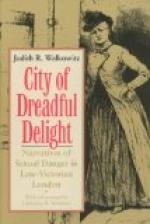But in Hannah’s face wavered signs of another interpretation of these things. She broke in on him without the patience to wait until he had completed his sentence.
“Are they prophecies of hope which are fulfilled, or the words of the prophet of despair?” she insisted. “What saith Daniel of this hour? Did he not name it the abomination of desolation? Said he not that the city and the sanctuary should be destroyed, that there should be a flood and that unto the end of the war desolations shall be determined? Desolations, Costobarus! And Laodice is but a child and delicately reared!”
“All these things may come to pass and not a hair of the heads of the chosen people be harmed,” he assured her.
“But Laodice is too young to have part in the conflict of nations, the business of Heaven and earth and the end of all things!”
A courier strode into the hall and approached Costobarus, saw that he was engaged in conversation and stopped. The merchant noted him and withdrew to read the message which the man carried.
“A letter from Philadelphus,” he said over his shoulder, as he moved away from Hannah. “He hath landed in Caesarea with his cousin Julian of Ephesus. He will proceed at once to Jerusalem. We have no time to lose. Ah, Momus?”
He spoke to a servant who had limped into the hall and stood waiting for his notice. He was the ruin of a man, physically powerful but as a tree wrecked by storm and grown strong again in spite of its mutilation. Pestilence in years long past had attacked him and had left him dumb, distorted of feature, wry-necked and stiffened in the right leg and arm. His left arm, forced to double duty, had become tremendously muscular, his left hand unusually dexterous. Much of his facial distortion was the result of his efforts to convey his ideas by expression and by his attempts to overcome the interference of his wry neck with the sweep of his vision.
“Whom have we in our party, Momus?” Costobarus asked. As the man made rapid, uncouth signs, the master interpreted.
“Keturah, Hiram and Aquila—and thou and I, Momus. Three camels, one of which is the beast of burden. Good! Aquila will ride a horse; ha! a horse in a party of camels—well, perhaps—if he were bought in Ascalon. How? What? St—t! The physician told me even now. Let none of the household know it—above all things not thy mistress!” The last sentence was delivered in a whisper in response to certain uneasy gestures the mute had made. The man bowed and withdrew.
A second servitor now approached with papers which the merchant inspected and signed hastily with ink and stylus which the clerk bore. When this last item was disposed of, Hannah was again at her husband’s side.
“Costobarus,” she whispered, “it is known that the East Gate of the Temple, which twenty Levites can close only with effort, opened of itself in the sixth hour of the night!”




